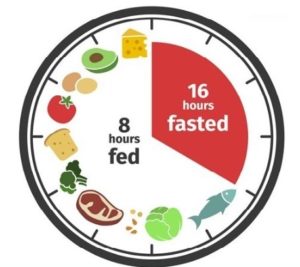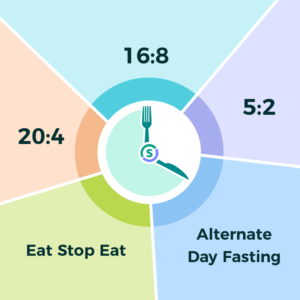Will intermittent fasting for sustained weight loss work for me? Expecting to maintain sustainable weight loss through intermittent fasting may or may not work for you. This is why studies show other diets work better for some people, but intermittent fasting do work for some.
Intermittent Fasting For Sustained Weight Loss
 In the pursuit of achieving sustainable weight loss, many individuals explore various dieting techniques, each promising remarkable results. One such approach that has gained immense popularity in recent years is intermittent fasting. Unlike traditional diets, intermittent fasting doesn’t prescribe specific foods to eat or avoid. Instead, it focuses on when you should eat, making it an appealing option for many people. Fasting is a practical and sustainable way to shed those extra pounds. In this blog post, we’ll explore how intermittent fasting can be a game-changer on your weight loss journey.
In the pursuit of achieving sustainable weight loss, many individuals explore various dieting techniques, each promising remarkable results. One such approach that has gained immense popularity in recent years is intermittent fasting. Unlike traditional diets, intermittent fasting doesn’t prescribe specific foods to eat or avoid. Instead, it focuses on when you should eat, making it an appealing option for many people. Fasting is a practical and sustainable way to shed those extra pounds. In this blog post, we’ll explore how intermittent fasting can be a game-changer on your weight loss journey.
What is Intermittent Fasting?
Intermittent fasting (IF) is not just a diet; it’s a pattern of eating. It involves cycling between periods of fasting and eating, with no specific food restrictions. During the fasting periods, you abstain from consuming calories, allowing your body to enter a state of metabolic rest. There are several popular methods of intermittent fasting, such as the 16/8 method. This is where you fast for 16 hours and eat during an 8-hour window. Also, the 5:2 method, where you consume a regular diet for five days and limit calorie intake on the other two non-consecutive days.
How Does Intermittent Fasting Aid Weight Loss?
1. Caloric Restriction:
Intermittent fasting naturally restricts the number of hours you can eat, which often leads to reduced calorie intake. This caloric deficit is essential for weight loss, as your body starts burning stored fat for energy.
2. Improved Insulin Sensitivity:
IF can improve insulin sensitivity, lowering the risk of type 2 diabetes. Better insulin regulation also means your body is more efficient at using carbohydrates for energy instead of storing them as fat.
3. Enhanced Fat Burning:
During fasting periods, your body’s primary energy source shifts from glucose to stored fat. This encourages fat burning and helps in shedding those unwanted pounds.
4. Preservation of Lean Muscle Mass:
Intermittent fasting helps in preserving lean muscle mass while promoting fat loss. This is crucial, as maintaining muscle mass is essential for a healthy metabolism.
5. Regulation of Hormones:
IF influences hormones like norepinephrine and human growth hormone. This plays a significant role in breaking down body fat and utilizing it for energy.
Making Intermittent Fasting Sustainable:
1. Start Slow:
Are you new to intermittent fasting? Start with shorter fasting periods and gradually increase the duration as your body adjusts.
2. Stay Hydrated:
Drink plenty of water, herbal teas, and black coffee during fasting periods to stay hydrated and curb hunger.
3. Prioritize Nutrient-Dense Foods:
When you break your fast, focus on nutritious, whole foods to provide your body with essential vitamins and minerals.
4. Listen to Your Body when using intermittent fasting for sustained weight loss:
Pay attention to your body’s signals. If you feel excessively fatigued or unwell, consider adjusting your fasting schedule. Consult a healthcare professional.
5. Combine with Exercise:
Incorporate regular physical activity into your routine. Exercise complements intermittent fasting, enhancing its benefits on weight loss and overall health.
Intermittent Fasting Schedule
Intermittent fasting (IF) is an eating pattern that cycles between periods of fasting and eating. There isn’t a one-size-fits-all approach. As the best schedule for you depends on your lifestyle, preferences, and health goals. However, here are a few popular intermittent fasting schedules that you can consider:

1. 16/8 Method:intermittent fasting for sustained weight loss
- Fasting Period: 16 hours
- Eating Window: 8 hours
In this method, you fast for 16 hours a day and restrict your daily eating to an 8-hour window, such as 12:00 PM to 8:00 PM. This method is popular because it’s relatively easy to follow and fits well with most daily routines.
2. 5:2 Diet:
- Regular Eating Days: 5 days a week
- Fasting Days: 2 days a week (not consecutive)
- Fasting Day Calorie Limit: Usually around 500-600 calories
On the fasting days, you significantly reduce your calorie intake, but you can eat normally during the other 5 days. It’s important to choose non-consecutive days for fasting.
3. Eat-Stop-Eat:
- Fasting Period: 24 hours
- Frequency: 1-2 times a week
With this method, you fast for a full 24 hours once or twice a week. For example, you might finish dinner at 7:00 PM and then not eat again until 7:00 PM the next day. This can be challenging for beginners, so it’s important to stay hydrated and listen to your body.
4. Alternate-Day Fasting:
- Fasting Period: Every other day
- Modified Version: Limited calorie intake (around 500 calories) on fasting days
On fasting days, you either abstain from food entirely or limit your intake to a few hundred calories. On non-fasting days, you can eat without restrictions.
5. Warrior Diet:
- Fasting Period: 20 hours
- Eating Window: 4 hours in the evening
During the 20-hour fasting period, small amounts of raw fruits and vegetables, as well as small amounts of protein, are allowed. Then, you eat one large meal in the evening within a 4-hour window.
6. Spontaneous Meal Skipping:Intermittent Fasting For Sustained Weight Loss
This approach is less structured. You skip meals whenever it’s convenient or when you’re not hungry. Some people find this method more intuitive and easier to sustain in the long run.
Remember, it’s essential to listen to your body. If you feel excessively fatigued or unwell, it might be worth reevaluating your fasting schedule. Also, it’s crucial to focus on the quality of the food you consume during your eating windows to ensure you’re getting the necessary nutrients. Before starting any fasting regimen, especially if you have underlying health conditions, it’s advisable to consult with a healthcare professional or a registered dietitian.
Intermittent fasting For Sustained weight loss Conclusion:
Intermittent fasting offers a sustainable and effective approach to achieving lasting weight loss. By embracing this flexible eating pattern, individuals can not only shed excess weight but also improve their overall health and well-being. Remember, the key to successful weight loss is consistency, patience, and a commitment to making healthier lifestyle choices. Intermittent fasting could be the tool you need to transform your body and embrace a healthier, happier you.
Searches related to intermittent fasting for sustained weight loss
intermittent fasting schedule
intermittent fasting schedules
schedules for intermittent fasting
how to intermittent fast for weight loss
intermittent fasting for sustained weight loss work
intermittent fasting to lose weight
fasting time
intermittent fasting for sustained weight loss
best intermittent fasting for weight loss
intermittent fasting schedule for weight loss
16/8 intermittent fasting schedule
intermittent fasting schedule for women
best intermittent fasting for weight loss
beginner intermittent fasting schedule
intermittent fasting rules
free intermittent fasting plan
best intermittent fasting schedule
